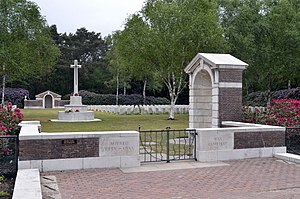Mierlo War Cemetery
| Mierlo War Cemetery | |
|---|---|
| Commonwealth War Graves Commission | |

Mierlo War Cemetery
|
|
| Used for those deceased 1944–1945 | |
| Established | Spring 1945 |
| Location |
51°26′09″N 05°35′49″E / 51.43583°N 5.59694°ECoordinates: 51°26′09″N 05°35′49″E / 51.43583°N 5.59694°E near Mierlo, Netherlands |
| Total burials | 665 |
| Unknown burials | 7 |
| Burials by nation | |
| Burials by war | |
| Statistics source: Mierlo War Cemetery | |
Mierlo War Cemetery is a Commonwealth field of honor at 68 Geldropseweg, West of the Dutch village of Mierlo.
The field came into existence in the spring of 1945, around the end of World War II. Most persons buried there died in the between September to November 1944, mostly in the region south and west of the river Meuse and, more to the west, during fighting for the Scheldt estuary.
The graves are arranged in 8 sections (numbered 1 to 8) with 6 or 7 rows in each section (A to F or G).
The Cross of Sacrifice at the cemetery was designed by Sir Reginald Blomfield. It is made of stone, with a bronze sword.
The Commonwealth War Graves Commission is responsible for the cemetery. A register and a guest book are present at the entrance.
The number of fallen in the cemetery is 665, of which 664 are soldiers of the Commonwealth of Nations. The identity of seven dead is unknown. One Dutch soldier is buried in the cemetery: soldier G.M. Stönner of the Koninklijke Nederlandse Brigade 'Prinses Irene'. An employee of the Commonwealth War Graves Commission was also buried here, in 1982.
...
Wikipedia
